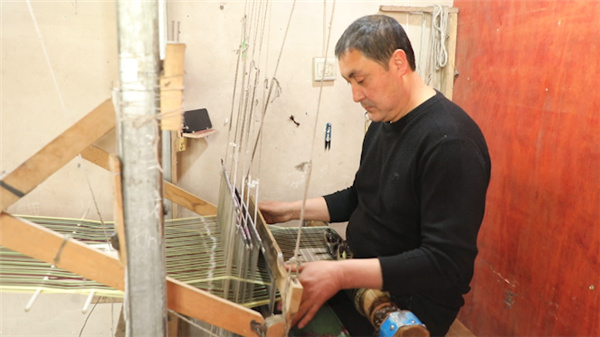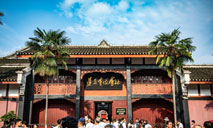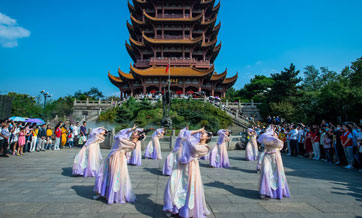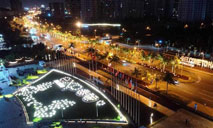Atlas silk industry leads villagers in Xinjiang to a better life
Atlas village in the Jiya township of northwest China's Xinjiang Uygur Autonomous Region has managed to help locals become better off by developing the local Atlas silk industry, a distinct fabric that has long been adopted for use by Uygur women for their traditional clothing.

A villager weaves Atlas silk by hand in Atlas village, Jiya township of northwest China's Xinjiang Uygur Autonomous Region. (Photo/People’s Daily Online)
With limited farmland nearby, the village has instead opted to vigorously develop its Atlas silk industry, making silk production a pillar industry of the local community, according to Yu Xiaofeng, an official from the village.
As of today, almost one-fourth of all the households in the village are engaged in the industry, Yu revealed.
In order to help villagers purchase a weaving machine, with an average price of 9,500 yuan (about $1,472) each, the Jiya township government has offered a subsidy of 6,000 yuan to villagers for each machine.
Atlas silk products have become much more diverse nowadays. In addition to clothing, one can also find Atlas silk ties, wallets, hats, bags and pillows. More and more Atlas silk factories and cooperatives have been established over time, offering a greater number of job opportunities to local villagers.

Photo shows Atlas silk. (Photo/People's Daily Online)
Awanisha Yasin, who produces Atlas silk using a weaving machine in Atlas village, has been one of the beneficiaries of this burgeoning industry.
"Each of the four members in my family knows how to weave and earns a monthly salary of about 6,000 yuan," Awanisha told People's Daily Online, noting that they now live a better life.
It's more efficient and less time-consuming to produce Atlas silk by machine than manufacturing the product by hand, she said.

A villager weaves Atlas silk by hand. (Photo/People's Daily Online)
It takes a worker one month to finish producing one piece of silk with the traditional production process, including reeling silk, spinning thread, dying, and weaving, the woman explained.
Memtimin Nuri is the owner of a silk mill in the village and an inheritor of the traditional techniques for producing Atlas silk crafts, which were listed as a form of national intangible cultural heritage in 2008.

Photo shows Atlas silk with different colors and patterns displayed in a shop. (Photo/People's Daily Online)
The man prefers to produce Atlas silk by hand instead of producing artificial silk using a machine. The veteran craftsman started to learn the techniques from his uncle when he was 10 years old. He is now also teaching his family members how to weave the silk fabric.

Awanisha carefully inspects the silk in the weaving machine. (Photo/People's Daily Online)
Photos
Related Stories
- Event on Xinjiang organized by U.S. and others is a political farce: Chinese UN mission
- Program of alleviating poverty by improving health care benefits senior residents in Xinjiang
- Commentary: The West's hypocritical political circus on Xinjiang
- Xinjiang cotton makes strong presence felt at China International Consumer Products Expo
- Washington's Xinjiang allegations unsupported by even a hint of evidence: U.S. media
- U.S. attempt to contain China by using Xinjiang issue is doomed to fail -- Chinese UN mission
- Explore enchanting scenery of Xinjiang
- European analysts question credibility of 'Xinjiang Uygur genocide' report
- New report by foreign experts refutes claims of genocide in Xinjiang
- China's pairing assistance program gives impetus to the development of Xinjiang
Copyright © 2021 People's Daily Online. All Rights Reserved.










